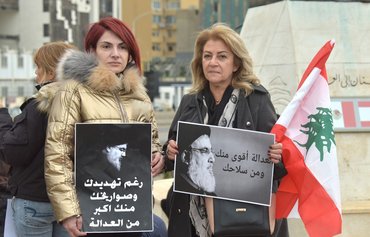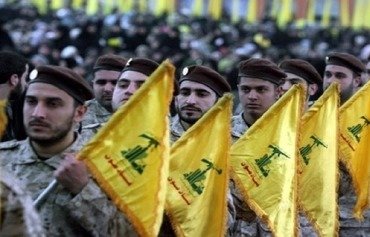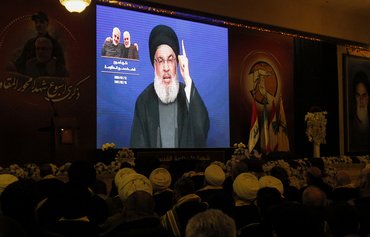A Lebanese network accused of laundering millions of dollars for "drug kingpins" and helping to finance Hizbullah was on Thursday (April 11th) sanctioned by the US Treasury Department, AFP reported.
The Treasury said it has added Lebanese national Kassem Chams to its blacklist, with two related entities: the "Chams Money Laundering Organisation" and Chams Exchange, a money service business in Lebanon.
"Kassem Chams and his international money laundering network move tens of millions of dollars a month in illicit narcotics proceeds on behalf of drug kingpins and facilitate money movements for Hizbullah," the Treasury said.
The Chams network moves money to and from multiple countries including Australia, Brazil, Colombia, France, Italy, Lebanon, the Netherlands, Spain, the US and Venezuela, the statement said.
The sanctions are part of a "campaign to prevent Hizbullah and its global terror affiliates from profiting off violence, corruption, and the drug trade", Treasury under secretary Sigal Mandelker said.
The Treasury's Office of Foreign Assets Control said Chams Exchange operates under license and supervision of the Central Bank of Lebanon "despite US authorities long suspecting it" of significant money laundering.
The Treasury said it remains committed to working with the Central Bank "to eliminate access to the Lebanese financial system by narcotics traffickers, money launderers, and terrorist groups such as Hizbullah".
The US has increased sanctions on Iran and this week designated its Islamic Revolutionary Guard Corps (IRGC) as a terrorist organisation in order to undercut its revenues and to financially squeeze regional allies like Hizbullah.
IRGC designation will hurt Hizbullah
As Hizbullah faces mounting financial challenges, the US designation of the IRGC will plunge the militia further into crisis, Lebanese experts said.
"The decline in Iran's financial capabilities as a result of the economic sanctions will undercut its ability to support and use Hizbullah," Lebanese Centre for Research and Consulting head Hassan Qutb told Al-Mashareq.
The US designation will complicate the IRGC's ability to operate, he said.
Earlier this week, the International Monetary Fund projected Iran's economy will shrink by a massive 6% this year, its worst performance since it contracted by 7.7% in 2012, AFP reported.
The latest figure represented a sharp deterioration from October's prediction of a 3.6% contraction, as US sanctions batter Iran’s oil sector.
Iran's financial difficulties "are beginning to become apparent in Iran’s cutback of its support for Hizbullah", Qutb told Al-Mashareq.
In a March 8th speech, Hizbullah chief Hassan Nasrallah acknowledged the financial strain his party is under as a result of US and Gulf state sanctions and the designation of his party as a terrorist group.
Nasrallah appealed to Hizbullah supporters for financial assistance in order to offset the impact of sanctions, Qutb said, noting that the militia has for some time now been following a policy of fiscal austerity.
The militia has cut back on the social services and salaries it provides to its fighters and their families, he explained.
Hizbullah 'in grip of a financial crisis'
The designation of the IRGC as a terrorist group "will exacerbate the financial hardships Hizbullah is experiencing and will certainly lead to curbing its influence and terrorist activities in the region", Qutb said.
This move also will serve to boost opposition to the militia in Lebanon, he said.
The militia "is now in the grip of a financial crisis due to the cutoff in the flow of Iranian financial support", said a financial expert who asked to remain anonymous.
The IRGC terror designation has dealt Iran a painful blow, he told Al-Mashareq, noting that as Iran comes under increasing pressure, Hizbullah's situation will worsen.
Hizbullah’s budget "was estimated three years ago at between $350 and $500 million annually, with a part of the funding coming from Iran and the other part coming from Latin America and some countries in southern Africa", he said.
Since then, however, US and Gulf state sanctions imposed on individuals and companies in Hizbullah's support base have "halted the flow of funds to the party", he added.
Impact on Hizbullah's support base
Prior to the anticipated US designation of the IRGC, key Hizbullah financiers Kassim Tajideen and Adham Tabaja were listed as Specially Designated Global Terrorists, journalist Hazem al-Amin told Al-Mashareq.
"We are waiting for clearer details of the sanctions and affected individuals and companies, but it is certain that Hizbullah will be affected by all this," he said.
According to al-Amin, the militia "is beginning to feel the blowback from the economic situation in Iran, which is clearly felt in Lebanon because Hizbullah is openly talking about a shortfall in its financial resources".
Nasrallah's mention of a financial pinch "is only the beginning", al-Amin said.
Hizbullah's financial difficulties "have begun to negatively impact its support base", he said, adding that as that impact grows more severe, the party's support base will begin to dwindle.

![Hizbullah supporters hold images of founder of the Islamic Republic Ruhollah Khomeini and Iran's supreme leader Ali Khamenei during celebrations marking the 40th anniversary of the Iranian revolution in Beirut's southern suburbs on February 6th. [Anwar Amro/AFP]](/cnmi_di/images/2019/04/16/17662-Lebanon-Hizbullah-Iran-600_384.jpg)






